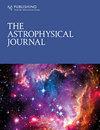基于深度学习的低分辨率流体力学模拟Lyα场重建
IF 5.4
2区 物理与天体物理
Q1 ASTRONOMY & ASTROPHYSICS
引用次数: 0
摘要
流体动力学宇宙学模拟是准确预测星系间介质(IGM)特性和生成可与观测数据进行比较的模拟天空的有力工具。然而,解决IGM中密度波动的需要对此类模拟的分辨率提出了严格的要求,这反过来又限制了可以建模的体积,即使在最强大的超级计算机上也是如此。在这项工作中,我们提出了一种新的建模方法,将物理驱动的模拟与数据驱动的生成神经网络相结合,产生的输出在定性和统计上接近流体动力学模拟的输出,分辨率提高了8倍。我们表明,与低分辨率模拟相比,Ly α通量场以及底层流体动力场大大提高了统计保真度。重要的是,我们的神经网络设计允许从给定的输入中采样多种实现,使我们能够量化模型的不确定性。利用试验数据,我们证明了该模型的不确定性与Ly α通量预测的真实误差有很好的相关性。最终,我们的方法允许在小的模拟体积上进行训练,并将其应用于更大的模拟体积,为产生哈勃大小的精确Ly α模拟天空打开了大门,这将通过DESI和未来的光谱天空调查进行探索。本文章由计算机程序翻译,如有差异,请以英文原文为准。
Reconstructing Lyα Fields from Low-resolution Hydrodynamical Simulations with Deep Learning
Abstract Hydrodynamical cosmological simulations are a powerful tool for accurately predicting the properties of the intergalactic medium (IGM) and for producing mock skies that can be compared against observational data. However, the need to resolve density fluctuation in the IGM puts a stringent requirement on the resolution of such simulations, which in turn limits the volumes that can be modeled, even on the most powerful supercomputers. In this work, we present a novel modeling method that combines physics-driven simulations with data-driven generative neural networks to produce outputs that are qualitatively and statistically close to the outputs of hydrodynamical simulations employing eight times higher resolution. We show that the Ly α flux field, as well as the underlying hydrodynamic fields, have greatly improved statistical fidelity over a low-resolution simulation. Importantly, the design of our neural network allows for sampling multiple realizations from a given input, enabling us to quantify the model uncertainty. Using test data, we demonstrate that this model uncertainty correlates well with the true error of the Ly α flux prediction. Ultimately, our approach allows for training on small simulation volumes and applying it to much larger ones, opening the door to producing accurate Ly α mock skies in volumes of Hubble size, as will be probed with DESI and future spectroscopic sky surveys.
求助全文
通过发布文献求助,成功后即可免费获取论文全文。
去求助
来源期刊

Astrophysical Journal
地学天文-天文与天体物理
CiteScore
8.40
自引率
30.60%
发文量
2854
审稿时长
1 months
期刊介绍:
The Astrophysical Journal is the foremost research journal in the world devoted to recent developments, discoveries, and theories in astronomy and astrophysics.
 求助内容:
求助内容: 应助结果提醒方式:
应助结果提醒方式:


